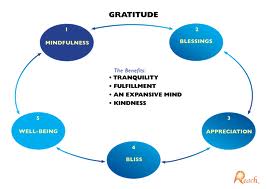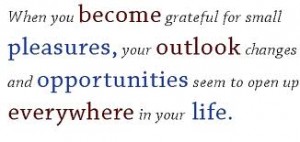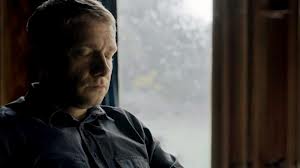What do you have to be grateful for? Do you ever think about it? Does it ever occur to you to be grateful?
Practising gratitude is inherent in many eastern ph ilosophies. It is difficult to feel negative feelings such as regret, disappointment and sadness if we spend our time feeling grateful for all the good things we have in our life. However low and desperate we may feel, for most of us, there is always a reason to be grateful. Did you eat today? Do you have a roof over your head? Do you have at least one person in this world who cares about you? Do you have children who love you? Do you have hobbies and interests that absorb your attention?
ilosophies. It is difficult to feel negative feelings such as regret, disappointment and sadness if we spend our time feeling grateful for all the good things we have in our life. However low and desperate we may feel, for most of us, there is always a reason to be grateful. Did you eat today? Do you have a roof over your head? Do you have at least one person in this world who cares about you? Do you have children who love you? Do you have hobbies and interests that absorb your attention?
Have you ever heard of a Gratitude Diary? Every night, before going to sleep, simply write down five things from your day that you are grateful for. They don’t have to be life-changing events, because, in life, it’s the little everyday things that really count. Some examples from my diary are: The book I’m reading; a smile from a passing stranger; hugging my daughters; yoga; the love of my parents; time spent with a close friend; a happy client; plain chocolate; a beautiful summer’s day; a trip to the beach; finding the ‘perfect’ clothes item; when everything just feels ‘right’; and finding a free parking space!
We are all individual and different things will please us and cause us to feel grateful. By keeping a diary, you will focus on all the positive aspects of your day, instead of the negative.  This will automatically improve your mood and encourage you to develop a positive outlook. If you practice gratitude on a regular basis, you are much more likely to look forward to your tomorrows, as you will find there is always something in your day to be thankful for. Try keeping your diary for a month and go to sleep feeling grateful for the day you have just spent, and looking forward to tomorrow.
This will automatically improve your mood and encourage you to develop a positive outlook. If you practice gratitude on a regular basis, you are much more likely to look forward to your tomorrows, as you will find there is always something in your day to be thankful for. Try keeping your diary for a month and go to sleep feeling grateful for the day you have just spent, and looking forward to tomorrow.


